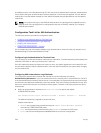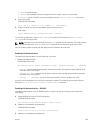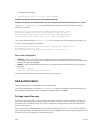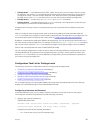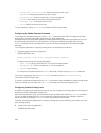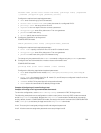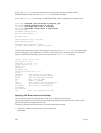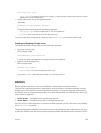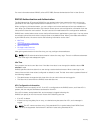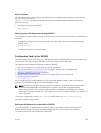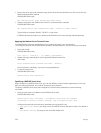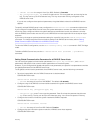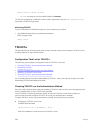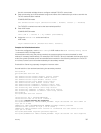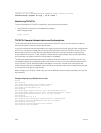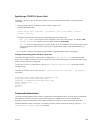
For more information about RADIUS, refer to RFC 2865, Remote Authentication Dial-in User Service.
RADIUS Authentication and Authorization
The Dell Networking OS supports RADIUS for user authentication (text password) at login and can be
specified as one of the login authentication methods in the aaa authentication login command.
When configuring AAA authorization, you can configure to limit the attributes of services available to a
user. When you enable authorization, the network access server uses configuration information from the
user profile to issue the user's session. The user’s access is limited based on the configuration attributes.
RADIUS exec-authorization stores a user-shell profile and that is applied during user login. You may name
the relevant named-lists with either a unique name or the default name. When you enable authorization
by the RADIUS server, the server returns the following information to the client:
• Idle Time
• ACL Configuration Information
• Auto-Command
• Privilege Levels Overview
After gaining authorization for the first time, you may configure these attributes.
NOTE: RADIUS authentication/authorization is done for every login. There is no difference between
first-time login and subsequent logins.
Idle Time
Every session line has its own idle-time. If the idle-time value is not changed, the default value of 30
minutes is used.
RADIUS specifies idle-time allow for a user during a session before timeout. When a user logs in, the
lower of the two idle-time values (configured or default) is used. The idle-time value is updated if both of
the following happens:
• The administrator changes the idle-time of the line on which the user has logged in.
• The idle-time is lower than the RADIUS-returned idle-time.
ACL Configuration Information
The RADIUS server can specify an ACL. If an ACL is configured on the RADIUS server, and if that ACL is
present, the user may be allowed access based on that ACL.
If the ACL is absent, authorization fails, and a message is logged indicating this.
RADIUS can specify an ACL for the user if both of the following are true:
• If an ACL is absent.
• If there is a very long delay for an entry, or a denied entry because of an ACL, and a message is
logged.
NOTE: The ACL name must be a string. Only standard ACLs in authorization (both RADIUS and
TACACS) are supported. Authorization is denied in cases using Extended ACLs.
792
Security



